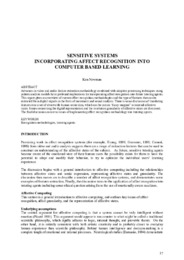| dc.contributor.author | Newman, Ken | en |
| dc.coverage.spatial | CY - Λευκωσία | en |
| dc.creator | Newman, Ken | en |
| dc.date.accessioned | 2016-02-15T06:24:53Z | |
| dc.date.available | 2016-02-15T06:24:53Z | |
| dc.date.issued | 2003 | |
| dc.identifier.uri | http://hdl.handle.net/10797/14658 | en |
| dc.description | Περιέχει το πλήρες κείμενο | el |
| dc.description.abstract | Advances in video and audio feature extraction methodology combined with adaptive processing techniques using pattern analysis models have profound implications for incorporating affect recognition into future tutoring agents. This report gives an overview of current affect recognition methodologies and the type of features that can be extracted from digital signals in the form of movement and sound analysis. There is some discussion of translating features into a set of observable human sentic data, which can be in turn ‘fuzzy-mapped’ to internal affective states. Issues concerning the digital representation and the resolution granularity of affective states are discussed. The final discussion concerns issues of implementing affect recognition methodology into tutoring agents. | en |
| dc.language.iso | eng | en |
| dc.publisher | Department of Educational Sciences, University of Cyprus | en |
| dc.relation.ispartof | Computer Science | en |
| dc.rights | info:eu-repo/semantics/openAccess | en |
| dc.rights | Open Access | en |
| dc.source | CBLIS Conference Proceedings 2003 Volume I: New Technologies and their applications in education | en |
| dc.title | Sensitive systems Incorporating affect recognition into Computer based learning | en |
| dc.type | info:eu-repo/semantics/conferenceObject | en |
| dc.subject.uncontrolledterm | Recognition methodologies | en |
| dc.subject.uncontrolledterm | Tutoring agents | en |
| dc.contributor.conferenceorganizer | Learning in Physics Group, University of Cyprus | en |
| dc.contributor.coordinator | Constantinou, Constantinos P. | en |
